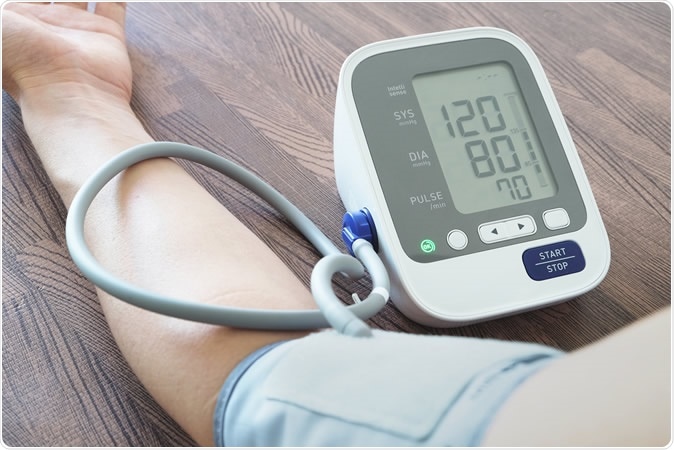Tighter blood pressure control is standard practice in hypertension therapy. Researchers have found that in addition to the benefits this provides to the heart and the vascular system, it also helps lower the risk of cognitive decline and dementia associated with age.

Image Credit: Seasontime / Shutterstock
The study titled, “Association of Intensive vs Standard Blood Pressure Control With Cerebral White Matter Lesions,” from the SPRINT MIND Investigators for the SPRINT Research Group, was published this week in the Journal of the American Medical Association.
The team performed brain magnetic resonance imaging (MRI) studies of 449 adult patients with high blood pressure to see the effects of blood pressure and its control on the brain. Tight blood pressure control or intensive blood pressure control refers to the systolic blood pressure maintenance of less than 120 mm Hg. Their results revealed that this tight blood pressure control helped significantly reduce the amount of white matter lesions or damage to the white matter of the brain. There was also a slightly more lowering of the brain volume in these patients compared to those who achieved a blood pressure of 140mm of Hg after medications. As per the guidelines laid down by the American Heart Association (AHA), high blood pressure is considered to be systolic blood pressure more than 130 mm and diastolic blood pressure more than 90 mm.
Lead author R. Nick Bryan, M.D., Ph.D., chair and professor of the Department of Diagnostic Medicine at Dell Medical School at The University of Texas at Austin, in a statement said, “The great news from this research is that high blood pressure is a treatable condition, and if you treat high blood pressure aggressively, you could have a positive benefit on cognition and brain structure.” He added, “Though the benefit may be small, it's one of the few impactful cognition-related interventions we have.”
The researchers explained that white matter of the brain and its damage has been linked to rapid cognitive decline and loss of cognitive abilities with age. This study is a follow up of a previous study by the same researchers that showed that if blood pressure control was tightened there was a reduced risk of cognitive decline and adverse cognitive effects. Both of these studies were funded by the NIH. The research is titled, “Systolic Blood Pressure Intervention Trial (SPRINT)”. These researchers have also found earlier that tighter blood pressure control is associated with lowered risk of heart failure, heart attacks and early death. The team of researchers working for SPRINT are out to study large populations to see the effects of lowering of blood pressure among patients with hypertension and its effects on various organs such as the heart, brain and the kidneys.
For this study the team compared the brain MRI scans of the 449 participants who were aged over 50 years (average age of 67 years) and had a systolic blood pressure between 130 and 180 mm of Hg. The participants did not have a history of diabetes or stroke and were recruited from 27 different sites from across United States. The participants were divided into two groups – one with an aim of blood pressure control to be maintained at 120 mm or below and another with aim of blood pressure control to be maintained at 140 mm or below. The MRI scans were performed at the start of the study and compared with another MRI scan taken after four years of follow up of the patients. Differences in white matter lesions and brain volume were noted between the baseline and follow up MRI scans.
Results showed that there was a slight increase in white matter lesions volume among those controlled at 140 mm or below at 1.45cm3 compared to those at 120 mm control at 0.92 cm3. The study also found that the average total brain volume decreased by 30.6 cm3 in the intensive treatment group and by 26.9 cm3 in the standard treatment group. The authors write, “More intensive blood pressure management was associated with less progression of cerebral small vessel ischemic disease, although the difference was small.”
According to Bryan, the team is now looking at the effect of tight blood pressure control on younger adults including those in their forties. He said, “We need to understand how aggressive should we be with blood pressure control when we're earlier on in the process.”
Authors conclude, “Among hypertensive adults, targeting an SBP of less than 120 mm Hg, compared with less than 140 mm Hg, was significantly associated with a smaller increase in cerebral white matter lesion volume and a greater decrease in total brain volume, although the differences were small.”